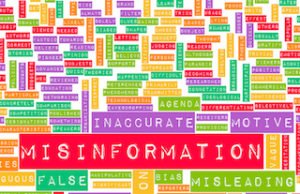Financial professionals and agencies operate in a complex environment. That’s why they often hire expert advisors to help them make good decisions. For example, they hire marketing consultants to build a website and execute marketing strategies. Or retain an IT expert to optimize their computers and close security loopholes. Or use lawyers and compliance experts to keep them out of regulatory hot water.
Hiring out may cost money, but it makes sense because no single advisor or agency can know everything there is to know about running a business. However, relying on outside experts has limits. When one’s ethics, integrity, and professional reputation are at stake, only an advisor or business owner can make the final call. Here’s a true story that illustrates this point (names changed to protect the…).
Last year, New Brighton, a Connecticut town of 40,000 residents, implemented a renewable energy strategy to save money and reduce carbon emissions. Part of this strategy involved harnessing solar energy to cut electricity costs at three community schools. After the Town Council approved the plan, it directed its Town Manager, Gary Birnbaum, to hire a consultant to identify solar-energy vendors who could install the energy-gathering panels.
Almost a year later, Birnbaum advised the Council the consultant had finished his work and that he (Birmbaum) had decided on a solar vendor. Interestingly, the company he selected, Green Light Solar, came out of the blue to snare the project even though it had not been one of the eight candidates on the consultant’s list. Now, “out of the blue” isn’t quite correct. That’s because one of the members of the New Brighton Town Council, Tom Mumford, worked at a real estate development firm called Brightworks, whose CEO was also co-founder and Chairman of the Board of Green Light Solar. This was a classic conflict of interest, raising questions about how Green Light managed to win the work so handily.
When Birnbaum presented his recommendation to the Town Council, Mumford recused himself from voting. The Council voted unanimously to approve the deal, and the project got the (cough) green light.
Fast-forward a year. In the intervening months, the project progressed largely under the radar. With the site plan completed (the panels would go on a municipally owned meadow behind the school) the only loose end was to inform the abutting neighbors, whose properties stood to lose value due to a large-scale solar array going in right next to their land. However, the town only gave itself a few weeks to communicate with the neighbors before construction was set to begin.
When the homeowners learned of the plan — installing a two-acre solar array in a four-acre pristine meadow almost in their backyards — they went ballistic. Oddly, the town decided to place the panels on open space despite the fact its consultant identified 25 other suitable sites. Making things worse, some residents never received the town’s formal notice. After banding together and doing their homework, the neighbors formed an ad-hoc citizen group and reached out to the minority party members of the Town Council, some of whom offered to support their cause.
Their first big opportunity was to bring their grievances before New Brighton’s Planning and Zoning Commission (PZC), which was considering whether to approve Green Light’s site plan. The PZC listened respectfully to the neighbors, but ultimately decided to validate the plan, even though it involved the installation of commercial property in a residential zone (Green Light, not the town, owned the panels). This normally would have required a special process, but the Town Council directed the PZC to circumvent it.
The neighbors only had one option left: petition the Town Council to revisit their prior decision and find a more suitable site for the panels (ideally on a “disturbed” plot of municipal land, not a pristine meadow ecosystem in a residential neighborhood).
Now we come to the ethical crux of the matter. When the motion to reconsider came before the council, Mumford chose to vote “no” despite his conflict of interest. With Mumford voting with the majority party, the motion failed and the project was cleared to begin construction.
End of story? Hardly.
Although the town had defeated the neighbors in several procedural battles, they were about to lose the public-opinion war. When the homeowners learned of Mumford’s relationship with Green Light’s Chairman of the Board and that the town’s failure to adhere to its own planning and zoning rules was a violation of state law, they decided to bring legal action against New Brighton.
The neighbors also kicked off a social-media campaign to save the meadow. Their arguments ranged from ecological (destroying the land was foolhardy given the town’s dwindling open space), business (Green Light’s cost-saving estimates were overstated), and ethical (the deal appeared to be ethically tainted due to Mumford’s Green Light connection). These points notwithstanding, the neighbors also made clear their support for green energy. Had the project been properly managed and free of ethical taint, they may have decided to accept it for the good of the community.
As opinions flew back and forth on social media, public opinion swung against the Council, especially against Mumford. The embattled councilman fought back, saying he took the second vote because New Brighton’s Town Attorney, Mike Marotta, told him to. The attorney’s rationale? That it wasn’t really a policy decision, just a procedural matter.
The neighbors felt this was a distinction without a difference. Since when is voting to put money in your boss’ pocket irrelevant, they asked. The social media flames continued burning, further blackening Mumford’s reputation. Then came the legal victories. After winning three procedural skirmishes at New Brighton Superior Court, the neighbors secured the right to have a judge hear their lawsuit. They also filed a formal ethics complaint against Mumford with the town’s Ethics Board, which put him under an even darker cloud.
Now, it’s important to say this about Mumford. People who know him say he is a nice, responsible, family man. But he’s also quite young (in his early 30s), in his first term on the council, and inclined to stick with his party rather than rock the vote. That’s probably why he accepted Marotta’s advice rather than think more critically about the impact of not recusing himself.
Even worse for Mumford, both the court case and the Ethics Board proceeding would occur during the Fall municipal election campaign, assuring maximum media coverage in an environment of partisan vitriol. Not a good time for anyone to be at the center of an ethics debate!
And that’s where the story ends. The court and ethics complaint have yet to be heard, and Mumford’s final reputation damage has yet to be tallied. But clearly, this whole matter did not help his political or business career.
Ethical takeaways?
There are two major ethical takeaways in our view:
First, Mumford should have recused himself from the second vote. Even though it may have been legally defensible, it was ethically damaging. Following the town attorney’s advice may have served the Town Council majority’s agenda and certainly helped his boss financially, but it clearly did not advance his own interests.
Second, he should have viewed the solar panel vote more broadly. Instead of seeing it as a test of party or business loyalty, he should have considered it a matter of personal integrity. Party and business relationships come and go, but being true to oneself is a lifetime proposition.
Why did we share this story about hometown cronyism on Insurance Forums? Because it is relevant to all financial advisors who hire outside experts. Here are the lessons we hope you’ll apply to your future decisions:
• Think through all ethical dilemmas for yourself. Be true to yourself.
• Run from any deal that has even the slightest appearance of ethical conflict.
• Don’t let experts bearing narrow advice blind you to larger truths.
• And do what’s right for all stakeholders, especially for you and your family. Your career and professional reputation will thank you.
Harry J. Lew is Chief Content Officer, National Ethics Association. For more information on affordable errors and omissions insurance for low-risk financial advisors, visit E&OforLess.com. For information on ethical sales practices, please visit the National Ethics Association’s Ethics Center













